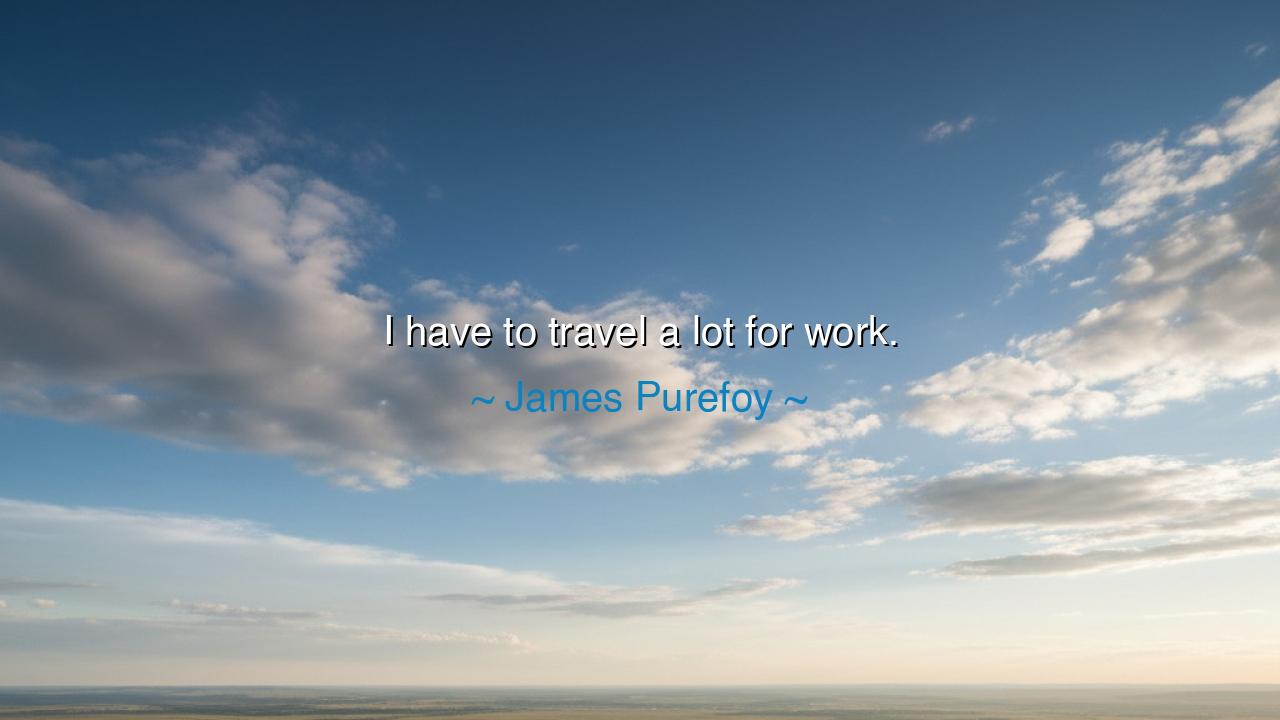
I have to travel a lot for work.






“I have to travel a lot for work.” Thus spoke James Purefoy, and though the words are plain, they conceal within them a truth that has echoed through the ages: that duty often calls us from the comforts of home, and that the path of labor is not always rooted in stillness, but in motion. For some, work is done with plow and soil, in one familiar field. For others, it is done with restless feet, carrying them across nations and seas. To travel for work is to be bound to a calling that demands sacrifice, distance, and the endurance of the wandering life.
In this reflection, Purefoy does not speak of leisure’s journey, nor the carefree wanderings of the pilgrim. He speaks of the necessity born of vocation, the kind of travel that is demanded rather than chosen. It is the reminder that the fruits of labor are not always gathered close to hearth and family, but sometimes lie scattered across the far corners of the earth. The worker who travels carries not only his tools but his very self as an offering, spending his time and energy in distant places so that his craft may reach its fullness.
History bears many witnesses to this burden. Think of the Roman legions, who were bound by oath to serve not at home, but in far provinces, carrying the empire’s banner to the edge of the world. Or recall the medieval troubadours, who traveled from castle to castle, earning their bread with song and story, never resting long in one place. Even the apostle Paul, laboring for the gospel, endured endless journeys across the Mediterranean, confessing that his work demanded constant travel, hardship, and sacrifice. In all these, as in Purefoy’s words, we see the timeless truth: to answer one’s calling often means to embrace the road.
And yet, there is greatness hidden in this burden. For to travel for work is not only to endure distance, but to grow in experience, to gather the wisdom of many lands, and to meet the countless souls whose paths one might never cross otherwise. Though the worker may long for home, the journey shapes him, chiseling strength and humility into his character. The road is harsh, but it also enriches. The one who returns from such travels does not return the same, but larger in vision, deeper in understanding.
At the same time, Purefoy’s words carry a shadow of cost. For constant travel takes from the traveler the warmth of continuity, the daily presence of loved ones, the steadiness of home. This has always been the sorrow of the wanderer: to give much to the world, yet sacrifice the nearness of hearth and kin. Here we are reminded of Odysseus, who after ten years of war and ten years of wandering longed for nothing more than to return to Ithaca. To travel for work is noble, but it is not without longing and weariness.
The lesson for us is twofold. First, embrace your duty, even when it leads you far from what is comfortable, for the path of labor and calling often demands sacrifice. Second, wherever you go, do not let the journey consume your soul—carry with you reminders of home, of family, of the roots that make you who you are. For the road may shape you, but it must never strip away the essence of your being. Travel for work, but never forget why you labor and for whom you labor.
Practical wisdom flows from this. If your work demands travel, let each journey be more than a burden; let it be a chance to learn, to connect, to grow. Guard your health, strengthen your spirit, and use the road as a place of reflection. When you are away, make deliberate efforts to stay close to those you love, so that the ties of home are not frayed by distance. Let travel serve not only your work, but your wisdom.
Thus, let Purefoy’s simple words echo with depth: “I have to travel a lot for work.” Behind them lies the eternal truth of labor, sacrifice, and growth. For to journey outward in duty is also to journey inward in strength. And though the road is long, those who walk it faithfully find that their toil is not in vain, but woven into the larger story of life’s purpose.






AAdministratorAdministrator
Welcome, honored guests. Please leave a comment, we will respond soon